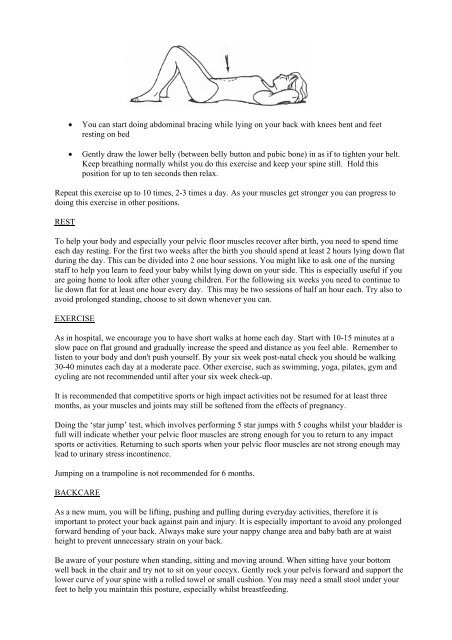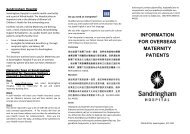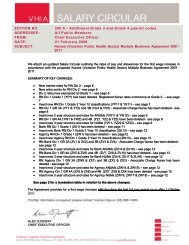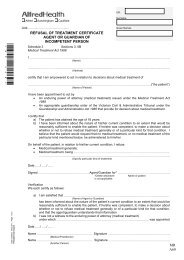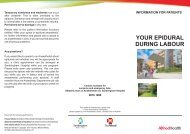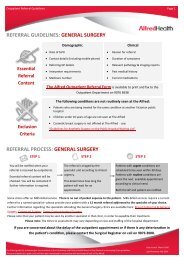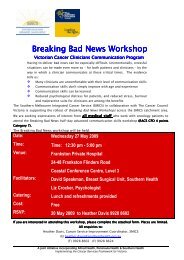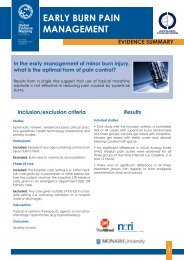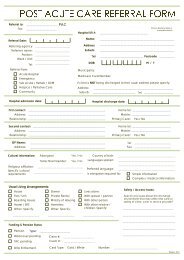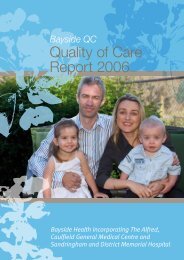Postnatal physiotherapy exercises for patients - Alfred Hospital
Postnatal physiotherapy exercises for patients - Alfred Hospital
Postnatal physiotherapy exercises for patients - Alfred Hospital
You also want an ePaper? Increase the reach of your titles
YUMPU automatically turns print PDFs into web optimized ePapers that Google loves.
• You can start doing abdominal bracing while lying on your back with knees bent and feet<br />
resting on bed<br />
• Gently draw the lower belly (between belly button and pubic bone) in as if to tighten your belt.<br />
Keep breathing normally whilst you do this exercise and keep your spine still. Hold this<br />
position <strong>for</strong> up to ten seconds then relax.<br />
Repeat this exercise up to 10 times, 2-3 times a day. As your muscles get stronger you can progress to<br />
doing this exercise in other positions.<br />
REST<br />
To help your body and especially your pelvic floor muscles recover after birth, you need to spend time<br />
each day resting. For the first two weeks after the birth you should spend at least 2 hours lying down flat<br />
during the day. This can be divided into 2 one hour sessions. You might like to ask one of the nursing<br />
staff to help you learn to feed your baby whilst lying down on your side. This is especially useful if you<br />
are going home to look after other young children. For the following six weeks you need to continue to<br />
lie down flat <strong>for</strong> at least one hour every day. This may be two sessions of half an hour each. Try also to<br />
avoid prolonged standing, choose to sit down whenever you can.<br />
EXERCISE<br />
As in hospital, we encourage you to have short walks at home each day. Start with 10-15 minutes at a<br />
slow pace on flat ground and gradually increase the speed and distance as you feel able. Remember to<br />
listen to your body and don't push yourself. By your six week post-natal check you should be walking<br />
30-40 minutes each day at a moderate pace. Other exercise, such as swimming, yoga, pilates, gym and<br />
cycling are not recommended until after your six week check-up.<br />
It is recommended that competitive sports or high impact activities not be resumed <strong>for</strong> at least three<br />
months, as your muscles and joints may still be softened from the effects of pregnancy.<br />
Doing the ‘star jump’ test, which involves per<strong>for</strong>ming 5 star jumps with 5 coughs whilst your bladder is<br />
full will indicate whether your pelvic floor muscles are strong enough <strong>for</strong> you to return to any impact<br />
sports or activities. Returning to such sports when your pelvic floor muscles are not strong enough may<br />
lead to urinary stress incontinence.<br />
Jumping on a trampoline is not recommended <strong>for</strong> 6 months.<br />
BACKCARE<br />
As a new mum, you will be lifting, pushing and pulling during everyday activities, there<strong>for</strong>e it is<br />
important to protect your back against pain and injury. It is especially important to avoid any prolonged<br />
<strong>for</strong>ward bending of your back. Always make sure your nappy change area and baby bath are at waist<br />
height to prevent unnecessary strain on your back.<br />
Be aware of your posture when standing, sitting and moving around. When sitting have your bottom<br />
well back in the chair and try not to sit on your coccyx. Gently rock your pelvis <strong>for</strong>ward and support the<br />
lower curve of your spine with a rolled towel or small cushion. You may need a small stool under your<br />
feet to help you maintain this posture, especially whilst breastfeeding.


